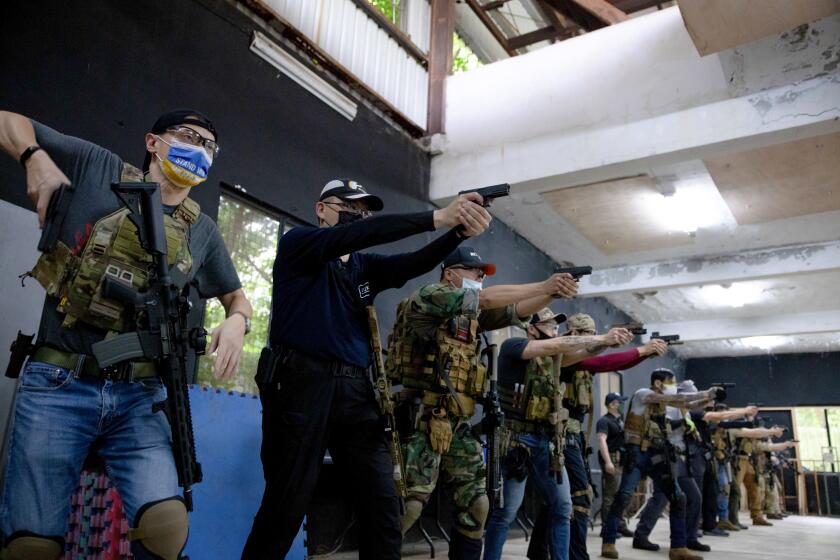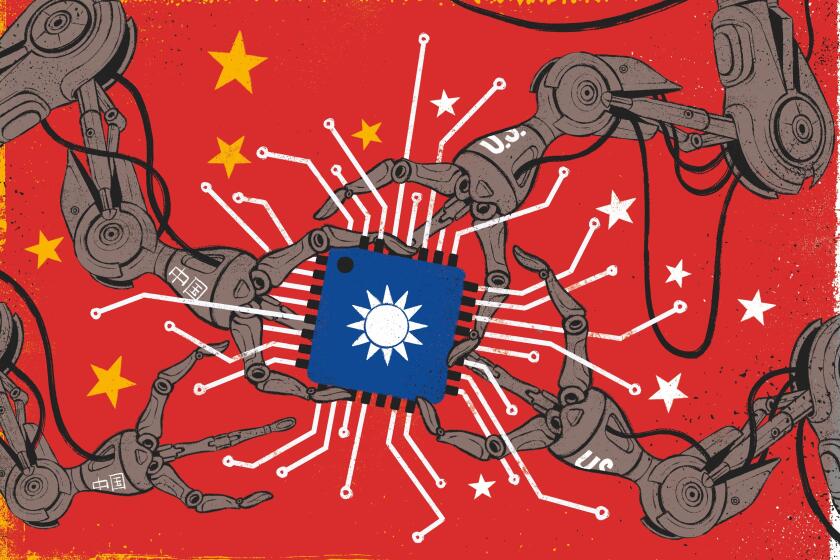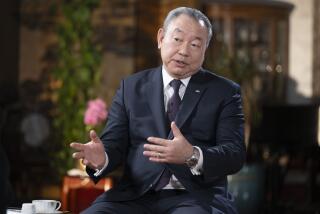Possible Pelosi visit elicits shrugs in Taiwan, long the focal point of geopolitical standoff
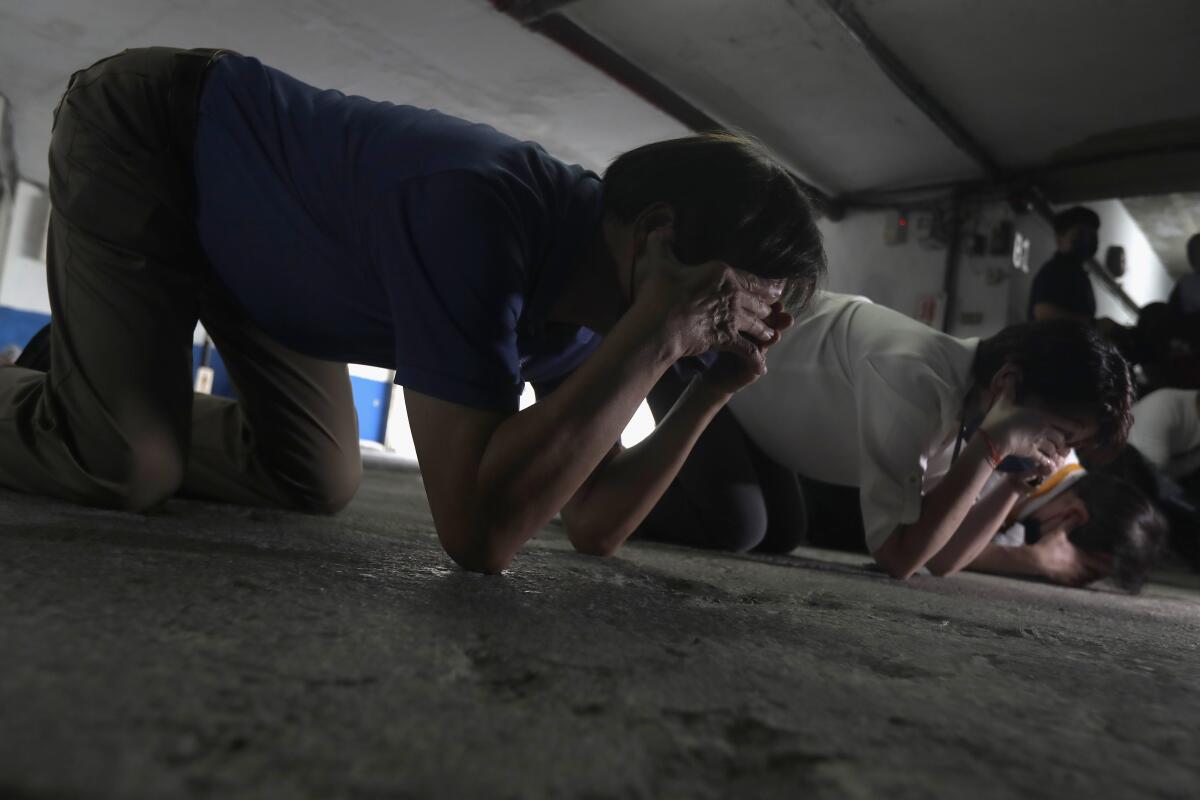
On the top of Iris Hsueh’s list of concerns living in Taipei are COVID-19 restrictions, electricity prices and, if she’s being honest, the latest news on Taiwanese pop stars. Nowhere on that list is the proposed visit of House Speaker Nancy Pelosi (D-San Francisco) and the potential Chinese backlash.
“Whether she comes or not won’t really change” anything, the 37-year-old saleswoman speculated. “I think China will think it’s a provocation, but I also don’t think they will escalate any actual military behavior because of this.”
Asked how her circle of friends feels about the standoff, which has prompted the deployment of a U.S. aircraft carrier group to the Taiwan Strait and China to conduct live fire military drills Saturday, Hsueh said matter-of-factly, “I don’t think they really care.”
As tensions flare between the two superpowers — risking the worst crisis in the region in a quarter of a century — people in Taiwan appear by and large to be responding with a collective shrug, occupying their attention with things like the summer heat wave and local elections rather than the specter of war.
Such is life on the self-governed island of 23 million that has long served as the focal point of an explosive geopolitical standoff. The threat of Chinese military action has loomed for so long that few seem to raise an eyebrow when Beijing lashes out, as Chinese leader Xi Jinping did Thursday in warning President Biden on a call that “those who play with fire will perish by it.”
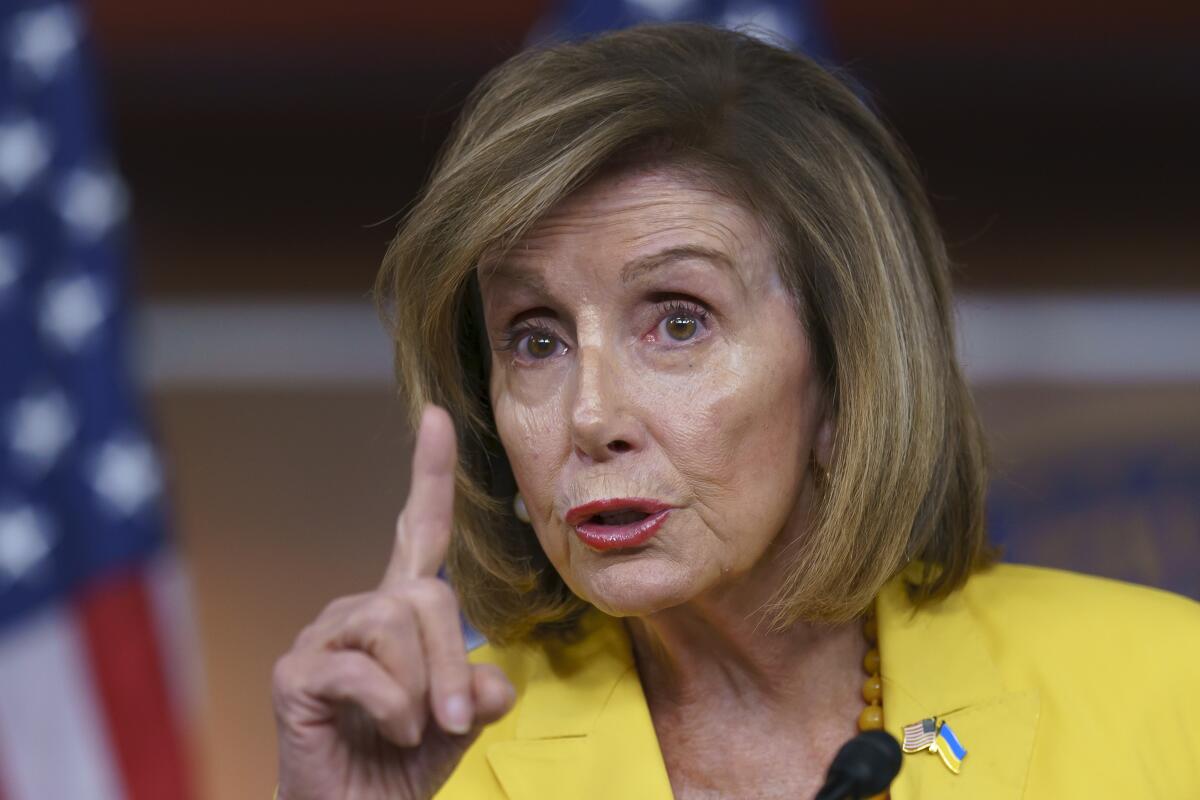
While the invasion of Ukraine has heightened concerns around the globe about a possible Chinese assault, many in Taiwan still view Beijing’s bellicose threats as largely bluster.
“The Chinese Communist Party is playing the same old tricks,” said Yisuo Tzeng, a research fellow at the Institute for National Defense and Security Research in Taipei. “They’re making a fuss about nothing.”
Pelosi, a frequent critic of China’s human rights abuses, left for Asia on Friday. Her itinerary includes U.S. ally countries Japan, South Korea, Malaysia and Singapore. As of Saturday morning, no plans were revealed about stopping in Taiwan. Biden said the Pentagon advised against her visit.
The rancor over the trip underscores how badly the U.S.-China relationship has soured in recent years and how firmly Taiwan remains its most dangerous flashpoint. Pelosi wouldn’t be the first House speaker to visit the democratically-ruled island; Republican Newt Gingrich made the trip in 1997. But China under Xi is a much more powerful and assertive country than it was back then, and it’s determined to dominate Asia in a way befitting of a great power.
Standing immediately in its way is Taiwan, a teardrop-shaped island roughly the size of Maryland located less than 100 miles off the coast of mainland China.
Formerly known as Formosa, the island was taken over by the fleeing Chinese Nationalist government after it was defeated by the communists in 1949, in the Chinese civil war.
Since Russia invaded Ukraine, more Taiwanese say they are willing to fight if attacked by China. But without firearms or sufficient military training, many wonder how to prepare.
Beijing considers Taiwan part of China, and after urging peaceful unification for years, has warned it will take the island by force if necessary — particularly if Taiwan formally declares independence.
Washington switched diplomatic relations to Communist China in 1979, adopting a “one China” policy that acknowledges Beijing’s claim to Taiwan, but doesn’t endorse it. To deter China from invading, the U.S. provides Taiwan with defensive weapons and maintains a policy called strategic ambiguity designed to leave China guessing as to whether American troops will defend the island if it is attacked.
While that approach has fostered a peaceful status quo for more than four decades, it has grown more fraught with the elevation of Xi, China’s most powerful leader since Mao Zedong.
Xi has hitched Taiwan to his grand project of national rejuvenation, marking the 100th anniversary of the founding of the Chinese Communist Party last year with a speech that described unification as “a historic mission and an unshakable commitment.”
Much of China’s military planning and modernization is geared toward an invasion of the island. The People’s Liberation Army Air Force has tripled the number of sorties it’s flown around Taiwan the first half of this year compared with the same period a year ago, a tactic aimed at prodding and exhausting the territory’s air defenses.
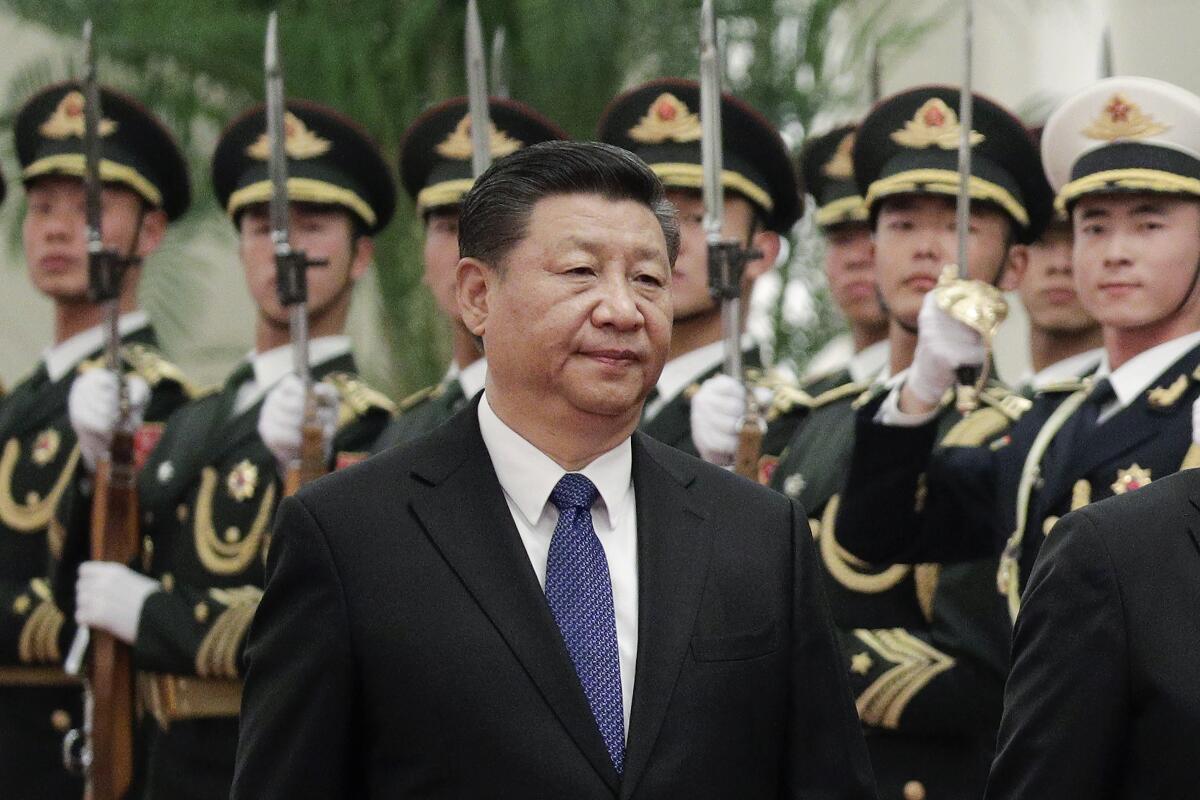
In June, Beijing said the sea separating China from Taiwan, known as the Taiwan Strait, did not qualify as international waters, claiming sovereignty over the waterway and challenging the U.S. Navy’s presence there.
Beijing has also accused the U.S. of blurring its “one China” policy when Cabinet officials and Congress members visit Taiwan with growing frequency. On three occasions Biden has made remarks suggesting the U.S. had discarded strategic ambiguity by pledging to defend Taiwan with force, but the administration has walked back the comments each time.
The tension between the nations with the world’s two largest economies shows few signs of abating. Xi will be less constrained after the 20th Party Congress later this year when he’s expected to secure his third five-year term, the first Chinese leader to do so since Deng Xiaoping imposed two-term limits in 1982. Biden’s ability to maneuver is also limited by the bipartisan enmity for China, one of the few issues rival lawmakers agree on in an otherwise severely polarized political climate. The call between the two leaders Thursday offered no offramps.
Caught in the cycle of escalation is Taiwan, whose voice is often drowned out by the din of Washington and Beijing. The government led by President Tsai Ing-wen has said little about a Pelosi visit — even as analysts say her appearance provides no concrete benefit to the territory and may be more trouble than it’s worth.
Taiwan Semiconductor Manufacturing Co. makes chips for iPhones, video game consoles and fighter jets. Now it’s being forced to choose sides.
“Taiwan’s agency in the U.S.-PRC-Taiwan triangle has varied over time, but at this moment, the drivers are the U.S. and China,” said Shelley Rigger, a leading Taiwan expert at Davidson College, using the initialism for the People’s Republic of China. “Taiwan is stuck in the middle.
“Unfortunately, I don’t think the Taiwanese government is in a position to speak frankly with U.S. officials,” Rigger continued. “The U.S. is Taiwan’s primary defender, and U.S. officials have shown a lot of ego and arrogance in the relationship. Offending American leaders by pointing out the downside of their decisions is not something Taiwanese officials are really in a position to do.”
Taiwan generally views visits by high-level U.S. officials and politicians as a political boost for the ruling party and a show of much-needed international support. Beijing has diplomatically isolated Taiwan to the point where it’s recognized by just over a dozen mostly small nations. China also thwarted Taiwan’s bid to join the World Health Organization assembly during the pandemic.
A Pelosi visit “would definitely encourage the people of Taiwan, basically saying that ‘you are not alone,’” said Chen Kuan-ting, chief executive of Taiwan NextGen Foundation, a think tank politically aligned with the governing Democratic Progressive Party.
That’s important because since Russia invaded Ukraine, confidence in Washington’s willingness to send troops to defend Taiwan in an invasion scenario has waned. A survey conducted by the Taiwan Public Opinion Foundation showed a 30% decline between last October and March in the number of respondents who believe the U.S. will come to the island’s aid.
Many in Taiwan say Pelosi can’t afford to back down, worrying another cancellation (she initially postponed a trip to the territory in April after testing positive for COVID-19) will send a signal to Beijing it can coerce and intimidate Washington.
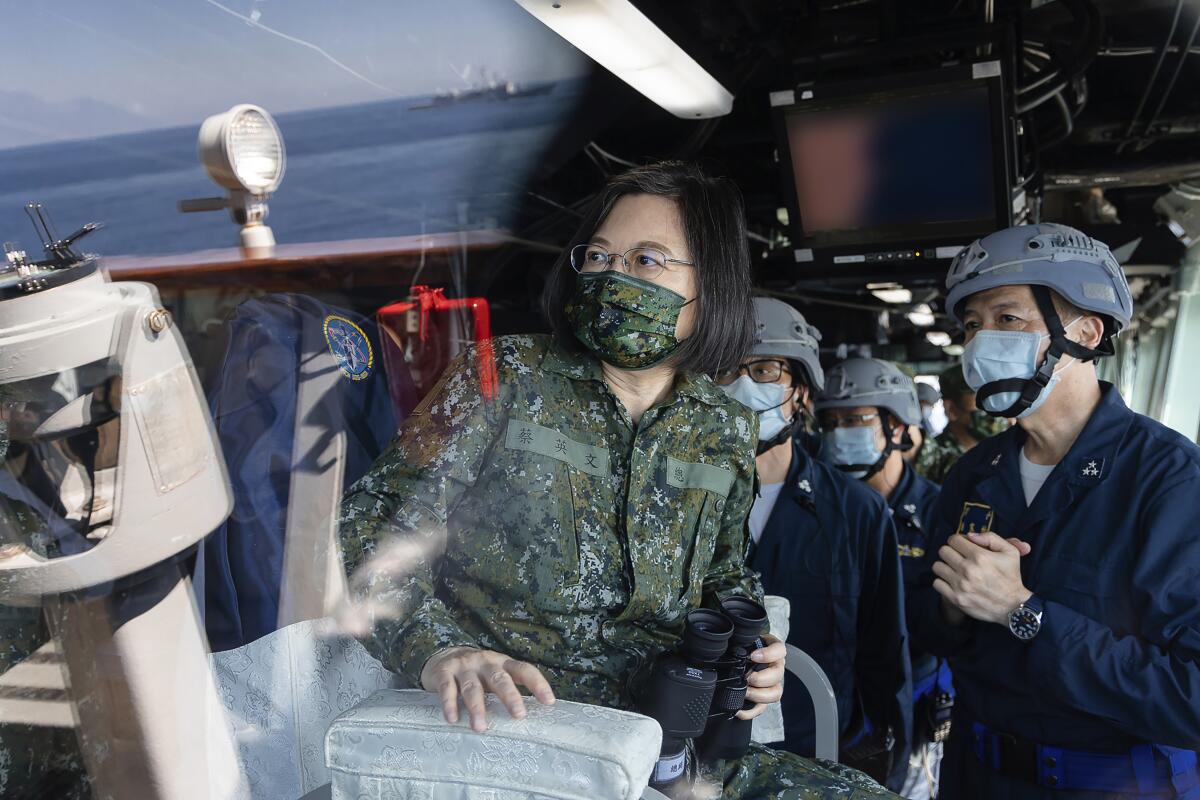
“Taiwan is a democratic country. We have the right to welcome any friend who supports” us, said Freddy Lim, a pro-independence legislator who met with Pelosi in Washington in June and urged her to visit Taiwan.
Beijing, which views a visit by Pelosi as a challenge to its sovereignty over Taiwan, said it would respond forcefully to her arrival. Analysts say China could place sanctions on the U.S. lawmaker, test missiles, or in the most provocative scenario, scramble fighters to try to turn her aircraft around. Doing nothing would make China’s leadership look weak, a problem China faces after threatening Taiwan for years.
“To have the same effect of cowing the Taiwan population, Beijing is forced to be more threatening,” said Ja Ian Chong, a political scientist at the National University of Singapore. “This cycle may continue until Beijing either has to follow through with its threats or its bluff is called.”
The last time tensions were this high in the region was in 1995, when then-President Lee Teng-hui of Taiwan sparked a furor in Beijing by visiting the U.S., breaking diplomatic protocol. China, which also wanted to send a warning to pro-independence groups before upcoming Taiwan elections, responded by conducting a series of missile tests in the waters off the island. The standoff ended when the Clinton administration deployed more warships to the Taiwan Strait than had been assembled since the Vietnam War.
Many in Taiwan don’t expect the same muscular U.S. response — not when China’s military has advanced enough to inflict massive harm to the U.S. Navy.
But in a country where air raid sirens and military drills are a regular occurrence, few seemed fazed by the latest crisis.
“Pelosi’s visit will add to the intensity of [Beijing’s] diplomatic remarks,” said Su Liu Di-Sheng, a 23-year-old graduate student in political science at National Taiwan University. “But the military risk has always been high.”
Yang reported from Taipei, Taiwan, and Pierson from Singapore.
More to Read
Start your day right
Sign up for Essential California for news, features and recommendations from the L.A. Times and beyond in your inbox six days a week.
You may occasionally receive promotional content from the Los Angeles Times.
